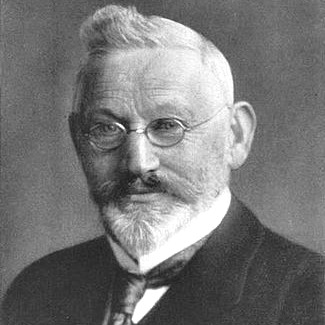- Surname:
- Binswanger
- First name:
- Otto Ludwig
- Era:
- 19th century
20th century - Field of expertise:
- Neurology
Psychiatry - Place of birth:
- Scherzingen (CHE)
- * 14.10.1852
- † 15.07.1929

Binswanger, Otto Ludwig
Swiss neuropsychiatrist
Otto Binswanger (1852–1929) was born in Münsterlingen, Switzerland, into a German-Jewish family of notable physicians and psychiatrists. His father, Ludwig Binswanger (the Elder, 1820–1880), founded the private sanatorium “Bellevue” in Kreuzlingen on Lake Constance, where he was succeeded as director by his older son, Robert Binswanger (1850–1910). Robert was the father of Ludwig Binswanger (the Younger, 1881–1966), a pioneer in the field of existential psychology.
Binswanger studied medicine in Heidelberg, Strasbourg, and Zurich. After briefly volunteering at his father’s sanatorium, he transferred to Vienna in 1875 to study brain anatomy at the psychiatric university clinic under Theodor Meynert. Between 1877 and 1880, he worked as an assistant at the pathological institute in Breslau and, in 1880, was appointed senior physician under Carl Westphal at the psychiatric clinic of Charité Berlin. Binswanger gained the formal qualification for a professorship (habilitation) with his 1892 work on brain malformation and was appointed associate professor at Jena University in the same year. He later also became the director of the municipal psychiatric hospital. He remained in Jena for 37 years. After his retirement, he moved back to Switzerland, where he died in 1929.
Scientific work
During the first half of his scientific career, Binswanger focused on researching the histopathology of progressive paralysis and other organic brain diseases. In 1894, for example, he described a chronic progressive condition of subcortical arteriosclerotic encephalopathy, which would later also go by the name of “Binswanger’s disease”. In 1899, he published the first comprehensive German-language monograph discussing epilepsy from a neurology perspective. He suggested a cause-based differentiation between epileptic seizures and epilepsy proper, which was groundbreaking for modern epileptology. Binswanger also addressed psychopathological issues and published studies on neurasthenia (1896) and hysteria (1904).
Günther Wagner (1996: 145) described Otto Binswanger as a clinician of international standing, who treated many prominent patients, among them the philosopher Friedrich Nietzsche and the writers Hans Fallada and Johannes R. Becher. He had a number of clinical students who would also become well-known researchers, such as the psychiatrist and neuroanatomist Korbinian Brodmann (1868-1918), famous for his mapping of the cerebral cortex. Binswanger placed particular emphasis on academic teaching and didactics. Moreover, he reformed psychiatric care at his Jena clinic, introduced occupational therapy, and strived to improve the patients’ living conditions.
A memorial plaque for Binswanger in Jena, removed by the National Socialists in 1939 because of his Jewish descent, was reinstalled in 2012.
Literature
Binswanger, O. (1882): Ueber eine Missbildung des Gehirns. In: Archiv für pathologische Anatomie und Physiologie und für klinische Medizin 87 (3), pp. 427–476.
Binswanger, O. (1896): Die Pathologie und Therapie der Neurasthenie. Jena: G. Fischer.
Binswanger, O. (1899): Die Epilepsie. Vienna: Hölder.
Binswanger, O. (1904): Die Hysterie. Mit 43 Abbildungen und 2 Tafeln. Vienna: Hölder.
Binswanger, O., E. Siemerling (1904, eds.): Lehrbuch der Psychiatrie. Jena: G. Fischer.
Binswanger, O. (1914): Die seelischen Wirkungen des Krieges. Stuttgart, Berlin: Deutsche Verlagsanstalt.
Hoff, P. (2002): Otto Binswanger (1852–1929). In: The American Journal of Psychiatry 159 (4), p. 538.
Schneider, R., V. Wieczorek (1991): Historical Aspects of Neurosciences. Otto Binswanger (1852–1929). In: Journal of the Neurological Sciences 103 (1), pp. 61–64.
Wagner, G. (1996): Otto Binswanger (1852–1929) – Nervenarzt und Kliniker von internationalem Rang. In: Medizinische Ausbildung 13 (1), pp. 145–155.
Weber, H. (2009): Juristensöhne als Dichter. Hans Fallada, Johannes R. Becher und Georg Heym. Berlin: Berliner Wissenschafts-Verlag, pp. 46–49.
Julian Schwarz
Photo: Anonym / Source: Wikimedia [public domain].
Referencing format
Julian Schwarz (2015):
Binswanger, Otto Ludwig.
In: Biographisches Archiv der Psychiatrie.
URL:
biapsy.de/index.php/en/9-biographien-a-z/293-binswanger-otto-ludwig-e
(retrieved on:23.07.2025)
